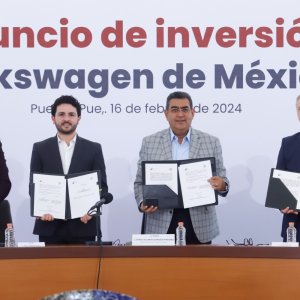Steady Growth in Mexico-Jordan Relationship

STORY INLINE POST
Q: Mexico and Jordan previously made significant progress toward a free trade agreement. Where does this process stand?
A: The establishment of a resident embassy in Mexico City is a translation of the vision of His Majesty King Abdullah II, who wanted to transform the relationship between Jordan and Mexico into a partnership that enables private companies, government and academic institutions to collaborate.
The relationship between Jordan and Mexico has grown at a steady pace since the establishment of a resident representation in Mexico City in 2015. Prior to that date, Jordan was represented through the Jordanian Embassy in Washington, D.C. Among the main envisaged benefits of the relationship between Jordan and Mexico is reaching a free trade agreement between the two countries that enables for a natural flow of goods and services and facilitates potential partnerships in different economic sectors. Jordan and Mexico engaged in negotiating this agreement but things came to a standstill due to technical challenges related to rules of origin. In the last round of negotiations in early 2019, Jordan submitted to the Mexican side several ideas to move forward but received no reply. By early 2020 and due to the pandemic, unfortunately, things came to a standstill.
All in all, the scope of cooperation between Jordan and Mexico is very wide and the potential for cooperation in sectors such as textiles, agri-industry, water management and pharmaceuticals is very promising.
Q: In which areas are Jordan and Mexico seeing the greatest commercial potential?
A: As I mentioned above, there are very obvious areas in which Jordan and Mexico can explore commercial and economic cooperation. Despite the differences in size, natural endowment and geographical distance between Jordan and Mexico, the two countries share many similarities. One is food security. In recent months, His Majesty King Abdullah II spoke about how the pandemic alerted us to the collective need to sustain our food supply chain. This should be a worldwide effort in which Jordan and Mexico, among others, can collaborate. As such, we see great potential in the agribusiness sector, including food processing, food manufacturing and water management.
We also see great potential in the textile industry, although some details on the rules of origin between Jordan and Mexico need to be worked out. There is also potential for the export of Dead Sea products to Mexico and the joint manufacturing of cosmetics. Last but not least, the pharmaceutical sector is an area in which Mexico and Jordan can explore ways and means to exchange research findings and address mutual health concerns. The Jordanian pharmaceutical industry is quite advanced; our drugs and medical products are always approved by the US FDA and the EU drug regulators. Because of that, I think there is potential to market those products in Mexico.
Q: How could the parallels between Mexico and Jordan help strengthen the bilateral relationship?
A: Both markets have realized their comparative advantages but they also know their limitations. As for Mexico, the US market is quite close and it makes a lot of sense to import products from that country. But there is also a price barrier. Particularly in the pharmaceutical sector, as mentioned above, Jordan can offer Mexico a wide range of pharmaceutical products and act as a natural substitute for what could be purchased elsewhere.
The embassy of the Hashemite Kingdom of Jordan in Mexico City has also worked tirelessly in the last year and a half to look into opportunities for cultural and academic cooperation. I had the privilege to visit institutions of higher education where I discussed student exchange programs, Arabic and Spanish training for non-native speakers and sabbatical leave exchange for faculty members. I think all of these factors make these two countries almost natural partners. What needs to be done to make this a reality is to create awareness in the business community about investment opportunities in Jordan and vice versa. One year into the pandemic, we have already started to resume meetings to promote these partnerships. We provide the business community in Jordan, for instance, with the necessary information to explore the Mexican market as a potential target for food imports. Given the interest Jordan has in agri-business and agriculture, we can learn a great deal from the Mexican experience in water management technology to optimize the cultivation of land in Jordan.
Q: One of the issues highlighted by the pandemic is the fragmentation of the health sector in Mexico. How could Jordan build on this?
A: The pandemic has demonstrated the shortcomings in investment in our health systems, whether in Mexico or Jordan. The scope of the challenge was not seen by many people and it is a wake-up call for all of us to invest in and strengthen our health sectors. There are multiple ways in which Jordan and Mexico can work together to address the challenge of the pandemic. Chief among them is the domestic production of vaccines under appropriate licensing arrangements. In midsummer, we hope to be able to collaborate in vaccine manufacturing, for example, with the view to providing more vaccines to the world and maybe Mexican companies can do the same.
Q: The tourism sector is renowned in both Jordan and Mexico. What can Mexico learn from the Jordanian experience and vice versa?
A: Following the historic visit of His Majesty King Abdullah II to Mexico in 2015, an MoU on tourism promotion was signed between Jordan and Mexico. That is essentially the legal framework for cooperation. In late 2019, I had the privilege of meeting with the Minister of Tourism of Mexico City and we put together a plan where the Jordanian Embassy could participate in various promotional activities. My goal was to utilize available events and platforms to speak about tourism in Jordan. I wanted to participate in different exhibitions to promote Jordan not only in Mexico City but in different states as a primary destination for religious tourism as far as Mexican Catholics are concerned. However, some events were canceled because of the pandemic and others had to be carried out completely digitally. Still, the potential is there and the plan is still on track.
Q: What are the main priorities for Jordan in strengthening the bilateral relationship with Mexico?
A: Jordan and Mexico recently celebrated 45 years of establishing diplomatic relations. Although the Jordanian Embassy has only been resident in Mexico City for five years, the relationship is a long-standing one. In 2021, we would like to host a couple of business delegations representing some sectors to explore the opportunities in Mexico and perhaps visit some of the states where business or networking can be done. We would also like to see some academic and cultural cooperation between institutions of higher education. We have visited Colegio de México a couple of times to raise awareness of academic opportunities in Jordan, as well as learning Arabic as a second language.
At the same time, when I was in Jordan, I spoke to some people in the academic community to encourage them to consider Mexico as a destination for learning Spanish as a second language, to explore sabbatical leave opportunities for professors or academics interested in Mexican history.
Q: What will it take for Mexicans to recognize the value of doing business with Arab companies?
A: Awareness is crucial. The geographic distance between Jordan and Mexico is huge and the business community has a conventional way of thinking. For example, if I am a businessman importing corn and getting it from China, I am comfortable and used to it and I will not look for other opportunities. Mexico offers many superior agricultural products to many of the countries that Jordan's business community imports from. That said, Mexico could be a natural destination for them. Awareness is key because people do not explore what they do not know.
Q: On the international stage, how do Jordan and Mexico share priorities in international politics?
A: Mexico now is a nonpermanent member of the UN Security Council. Mexico has always played a positive and constructive role to support important issues of concern to the Middle East. Despite many political and other challenges, the pillar of a stable Middle East remains reaching a solution to the Palestinian-Israeli conflict based a two-state solution and international legitimacy resolutions. Mexico can positively project support of all issue of common interest with the Middle East, especially given its concern about refugees and migration. Jordan, on its part individually and as part of the Arab Group in Mexico City, has communicated with the Mexican government on those issues. It is noteworthy that when I had the privilege of submitting my credentials to President Andrés Manuel López Obrador, he committed to solidarity with Middle East issues and that is beginning to manifest itself.







 By Andrea Villar | Editorial Manager -
Mon, 07/05/2021 - 09:18
By Andrea Villar | Editorial Manager -
Mon, 07/05/2021 - 09:18
















